Talking with 50-Year-Old Skateboarder Dr. Indigo Willing
Fellow mid-life skateboarder and author Aaron Gilbreath interviews the sociology-Ph.D.-slash-female-skateboarding-sensation.
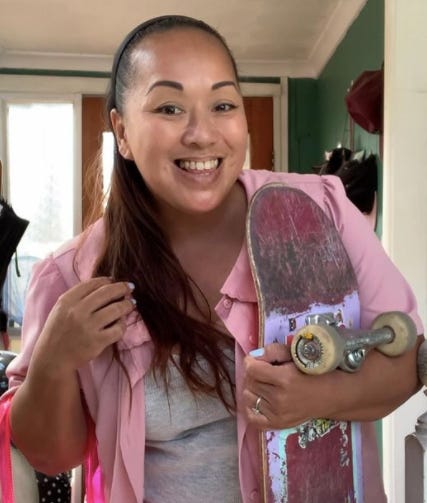
In September, 2021, Dr. Indigo Willing tweeted from Brisbane, Australia: “Started skating at 41 as a mum, just after getting PhD - turning 50 next month. Super stoked, it’s the most fun decade of my life. A bit optimistic but want nice kickflip and maybe tre flip next decade Who knows? Every trick or goal is just ‘something you haven’t got yet.”

Dr Indigo Willing is a Sociologist, a mother, a refugee from the Vietnamese War, an author, and an activist who founded Consent Is Rad, the Adopted Vietnamese International Network, and one of Australia’s largest all-female skate groups, We Skate Queensland. Her tweet quickly chocked up thousands of likes and millions of views, just as it should.
Because I’d resumed serious vert skating at age 44, people started sending me Dr. Willing’s tweet. Have you seen her? they said. Yes, I said, and now I want to be her! I’d also seen the footage of 65-year old Lena Salmi skating in Helsinki. And the footage of 81-year-old Yoshio Kinoshita skating in Japan. These kindred spirits didn’t just resume skating late in life like I did. They learned to skate at advanced ages, from scratch. People thought they were nuts: You’ll hurt yourself! You’re too old for this! Nonsense. “I just wanted to be in better condition than when I was a 40-year-old,” Lena Salmi said. At age 46, I’m constantly being warned by people to be careful skateboarding, but using a kitchen table for a remote work desk has messed me up much more than any skating accident. You also never know how much more time your body will give you. As middle-aged skater Mackenzie Eisenhour said at Transworld, “Every session is a crapshoot. …There is no guarantee you can do it again tomorrow.” That’s why we skate today.
Skating means different things to everyone. For me it’s a joyful, graceful kind of dance but also a metaphor for life: how you embrace fear, challenges, and the inherent discomfort of the human experience. Dr. Willing spoke with me about what skating means to her, what it gives to her community, and how she rides through agism, sexism, and middle age.
Aaron Gilbreath: Had you ever skated before age 41?
Indigo Willing: Yes, in a very casual way, maybe on people’s driveways with old fashioned 1980s boards. I grew up near the coastline, and everybody had a board under their feet in one way or another. But the actual culture of skateboarding, where I ride a popsicle board, get a bit obsessed, am always trying to progress, and see the street in a different way—that didn’t happen for me until I was 41.
AG: What drew you to skateboarding?
IW: What attracted me initially was that I grew up next to a 10-foot-high vert ramp. For many years, when I’d catch the bus to school and to work, I’d see all these dudes on this ramp having enormous fun. They looked like eagles that were free: soaring with absolute joy, grace, power, camaraderie. They were having the time of their lives and doing something incredibly dangerous and mysterious. You don’t know how to drop in until you drop in smaller things and progress to the highest stuff and you have friends who back you up and teach you how to drop in, otherwise you'll just kill yourself. Even though the guys at my local skatepark might have been absolutely cool—if not, you know, pleased to have a girl skater amongst them—I felt too shy to go into the space of the skatepark. I didn’t have enough confidence. And as an immigrant, I grew up feeling like an outsider. If the park had put up posters that said, ‘Come every Saturday, girls welcome, beginners welcome, learn how to roll,’ I would have done that. But those opportunities were much rarer when I grew up. But all that time, I thought, One day I’m going to learn to skateboard. When the time’s right, I will. It was also a philosophy: You can have everything you want, but not all at once. So I felt like it was my duty to be grateful for the opportunities I had, escaping the Vietnam War and growing up with opportunities in Australia, so I worked and studied hard. Then I became a mom. It wasn’t really until my son started school that I thought Okay, now’s the right time for me to skateboard. So that’s how I started. It was the right time. I had that dream inside of me, and then it was time to live out one of my long-held dreams. So I don’t know if it was age so much as the context. It was also a welcoming time.
I found somebody else to ride with, who used to skate very well: Evie Ryder. She felt a lot of discrimination and had stopped skating at the parks. We now co-run the skate network We Skate Queensland together with Tora Waldron, Sophia Ross, and a bunch of others. But at the beginning, Evie and I gave each other the courage to skate together. Later on, the skate parks, where there were lessons and people were welcoming, made a huge difference, encouraging me to get heavily involved and to learn tricks, not just dropping in, but really wanting to progress to some of the difficult tricks. So I’m so grateful for everybody who welcomed me into skateboarding. Skateboarding can be a mirror of truth to see ourselves. A skateboard never lies to you. It treats you as you treat it, and you see back what you give it. There’s always a sense of accomplishment—every session is an accomplishment—so it doesn't matter if it’s a really crappy car park with poor lighting or it’s a million dollar skate park. In fact, the car park can be more fun. As long as you have some concrete and your board, you can have the time of your life. What a gift.
I’d like to think that skateboarding has kept me as punk as I was back when I was 21. Only now I have more tools in the toolbox to dismantle gates that are built to exclude and throw shadows over the people and things I care about.
AG: What do people say when they see you skating? Do certain comments stick in your mind?
IW: I did get some strange comments from people, mainly because they weren’t expecting any girls to skate at the park, because not many girls skated. When I started, I looked pretty young. I’m Asian. I’m only four-foot-five, so from a distance, with my baseball hat and practical skater clothes, I looked like a little kid. At one park in the UK, the police even pulled over to check if I was skipping school. So I didn’t tell everybody how old I was when I started skating, because I wanted to be treated as an equal. I wanted people to feel like I had potential, and if I told them how old I was, they would think, Oh, she’ll never want to learn street skating, she’ll never want to learn rails, she'll never to try a stair set. But I’ve always been attracted to adventure. I like to just throw myself into things. I’m a lot tougher than I look. I wear a lot of pink. I present very feminine, but I’m sort of a Libra, which are contradictions. Although I’m girly looking on the outside, I’m tough as nails.
AG: There’s the ageism, and there’s the sexism.
IW: People can also be a little over-enthusiastic and give you unsolicited advice. For instance, if I’m just warming up and I’ve got a trick on lock, but it takes me about 20 goes to remind my body how to do it after I arrive at the park—people can give me unsolicited advice or comments, saying Oh, you should do this or you should bend your knees or, you know, put your shoulders here. My body’s very different from theirs, so sometimes it’s helpful sometimes it’s not. I think if somebody learns a trick when they’re a skinny 12-year-old boy, it’s not the same as trying to learn that trick as a curvaceous older woman. Little things like that can be a bit weird.
The older you get, the more injuries you accumulate that people can’t see. So you might have had some knee operation or ACL problems, or your ankles are toast or whatever. Then people will give you advice like Oh, you need to pop more or do this and that, but your body physically can’t. It’s sort of at the end of its capacity, and you need to modify how you skate. It’s best just to ask people if they would like help, because their body is not your body. And adults often work five days a week and only get to skate weekends. They don’t get the consistency they did when they were younger and could skate every day. All those things just need to be in the back of people’s minds before they give out comments to people who aren't skating like they’re at Street League.
My viral video has been shared well over a million times, so it has had a lot of likes and also attracted a lot of weirdos who comment. That’s where I got more than the usual ‘Be careful’ and ‘You should do this and that’ advice. For some people, it’s not about my health. It’s about control. And there are assumptions about how people skate. If I’m coaching, I tell people to wear all their safety gear, especially if they’re 18 and under and beginners, but I wouldn’t go to a figure skating event and tell people they shouldn’t hold that person upside down while doing a twist. Dancers, gymnasts, martial artists, figure skaters—taking calculated risks is part of what they do. There are particular contexts where we don’t feel the need to yell at people doing high impact sports about what to do with their bodies. But for skateboarding, for some reason, people really overstate what’s appropriate and start lecturing you, and that’s not very helpful. And it doesn’t take into account the calculated risks, the training that you’ve done, that, as with martial arts, you’ve learned how to fall reasonably well. Because yes, we will hurt ourselves. But that happens in lots of sports. You just have to let people make their own choices and see how they go.
AG: Well said. Before my father died in 2019, I told him I was skating ramps and bowls harder than ever. He didn’t disapprove. He didn’t say anything. He just studied me from the corner of his eye and smirked. No words were necessary: He thought I was nuts and he loved that about me. I wish I could show him videos of the stuff I pull on coping now.
IW: That’s really beautiful. It looks like you had a really kind, slightly cheeky, nice fella, who knew you well.
Other comments that come to mind are really positive ones. At the park, if people say ‘Hey, that’s sick that you’re skating,’ ‘Good to see here,’ and ‘Gee, you’ve got a lot of style.’—when people say the positive side that you skate in older age, that is amazing. Somebody might have a really good flow, they might have a natural kind of style, and it’s nice when people cheer you on and recognize that. Whether somebody’s dropping in for the first time, or they’re learning something and overcame their fears, it means the world when total strangers are just as excited as you that you nailed a trick. That’s something very special about skating, and that collective joy at the park is really amazing. It’s for no other reason than we’re just happy for other people to share something that we love.
Skateboarding keeps you in contact with all kinds of people that university keeps out. It’s a subculture, not some classroom with a set of rules you need to obey.
AG: When you’re an older skater, people can be so cautious for you. Be careful! Wear your pads! Don’t break anything! Or worse: Why are you doing that? I often say: “Don’t worry more about me than I worry about me.” Are your friends or family hyper-protective or no?
IW: That’s a great question, Aaron. I relate to that. Only my mom’s mom [who] sort of says ‘Please don’t do that.’ Everybody else knows that they don’t get a say in how independent and stubborn I am, and I just do what I want most of the time.
I was in the orphanage when I was very young and was adopted by an Australian family during the Vietnam War. I grew up looking different from my family. I grew up being treated by strangers and people at school like I wasn’t even a citizen in their country, so I always felt like an outsider and a misfit. You can be defeated by that. It can get to you. One way to overcome that is to thoroughly be like: Well, I’m gonna do what I want to do and fun and just live. Skateboarding means something to me. Maybe it numbs the pain, and maybe it gives me joy, when my feelings can dip down. Skateboarding is a sanctuary, a special place that makes me feel alive and good. I found a happy way to channel my energy positively to cope with all the loss and what I’ve been through. I have an enormous amount of energy. My mind runs very fast. I have a PhD because I needed some way to absorb all my thoughts. So skateboarding is perfect for me, because I’m inquisitive, I like taking risks in a positive way, I like adventure, I like creativity, and I like to throw myself into things 100%. So skateboarding is for me.
AG: If many people like your mom’s mom try to protect us older skaters from injury, let’s reverse it: What do you think that overly cautious, non-skating people are missing? What could skating give them?
I’d rather carry a skateboard than a briefcase and learn as much as I can in the streets as I learn in a library.
IW: Adventure is good for those it’s good for. Some people have other strengths and urges. I think it’s great that the population has different danger acceptance levels and risk impulses. Diversity in any situation is a strength. If non-skaters were to think about it though, skateboarding is really humbling and exhilarating at any age. A lot of other things you get good at can give you a big ego, and this flat piece of wood is always going to teach you a lesson, give you a goal that doesn’t hurt anyone else but means a lot to you, and makes you appreciate even the smallest breakthroughs. If you find something that does the same, then you’re in for an interesting life.
AG: People have so many perceptions about skateboarding: It’s for punk asses. It’s for guys. It’s for young, childless people. Here you are, a 50-year-old, academic, mother. Has skateboarding taught you things that you now bring to your work as an academic?
IW: I’d like to think that skateboarding has kept me as punk as I was back when I was 21. Only now I have more tools in the toolbox to dismantle gates that are built to exclude and throw shadows over the people and things I care about. I’d rather carry a skateboard than a briefcase and learn as much as I can in the streets as I learn in a library. Skateboarding keeps you in contact with all kinds of people that university keeps out. It’s a subculture, not some classroom with a set of rules you need to obey. Yet a lot of university knowledge, especially from First Nations, people of color, and marginalized people, is about challenging established beliefs and the harmful things society makes us take for granted or see as status quo—or just highlighting injustices and histories we don’t want to get complacent about. Maybe both skating and formal education can do a little something for each other.
AG: Do you ever wish you’d discover skating sooner: Kick yourself, like Why did I wait so long to get into this?
IW: Always. Every day you skate is special in one way or another. I’d love to have a lifetime of skating. Skating is my life now though, so to quote the late, great skateboarder Shane Cross, “Let’s live.”
AG: Have you seen the video of 65-year-old Lena Salmi skating in Helsinki? She’s wise. Calls skating “Pure fun.”
IW: Lena Salmi looks like she’s having pure fun and is a kind person. She shows us how ageless skateboarding is and how it can spread good energy.
The best time to take a break and step off the board is when something doesn’t feel right or you are not having fun. Knowing when not to force yourself to have fun, how to be strategic about how to skate longer, and adapting your skating with age, are key skills to learn. Salmi’s trick looks like good company, good self-knowledge, and a good attitude.
AG: It’s interesting that people treat older skaters as out of sync with their age, because the 81-year-old skater Yoshio Kinoshita in Japan has the complete opposite perspective: He skates five or six times a week simply because it makes him happy, and he said that skating is actually a sport for the elderly, because the way it forces you to think fast—and keeps him from staring into space all day—will hopefully prevent dementia. What do you think about that idea?
I’m a lot tougher than I look. I wear a lot of pink. I present very feminine... Although I’m girly looking on the outside, I’m tough as nails.
IW: Yoshio Kinoshita is such an inspiration for us all. I love his outlook and theory about skating and the brain. There’s a great field of research waiting to really take off in terms of skating and neurological benefits such as what Hull Skateboarding and others are doing, or John Rattray in the area of mental health and suicide prevention. Dancing is meant to be great for people with dementia, so skateboarding would no doubt have benefits, too.
AG: Lena Salmi said: “There will be one day when I don’t do these things.” How long do you think you’ll keep skating?
IW: I hope I skate forever, even in paradise. On earth, turn my tombstone and grave into a ledge and pole jam others can skate when I’m gone, hehe.
AG: Talk to me about your injuries: What were the worst ones?
IW: A few mild concussions. A few rib injuries. Had to watch my spleen from bursting at some stage. Knee bone contusions. I always get snake bites on my ankles from others out of control boards flying into me as people don’t yell ‘board!’ as much as they use to when someone shoots out. I’m a real doofus when I skate too, so usually I’ll pay the price for taking on a dare, like trying to ollie off a loading dock in my late 40s when I haven’t even rolled off a curb in years. But it’s like martial arts, boxing, or football: You learn to roll and throw your body around in a way that’s different to the rest of the population. If I fell over before I was a skateboarder, I would’ve hurt more than as a skateboarder now throwing myself down five stairs on a piece of wood with wheels on it, lol.
AG: How do you approach the necessity or inevitability of busting up your body?
IW: Dr. Kylebrown on Instagram is awesome to watch as he does all these exercises for skateboarders, both prevention and post injury. I spend a long time warming up before every skate. And I am more and more intrigued by Asian practices like tai chi, which centers your energy, focus, and body. Martial artists take a lot of hard blows, so there’s lots we can learn about doing extreme things with our body.





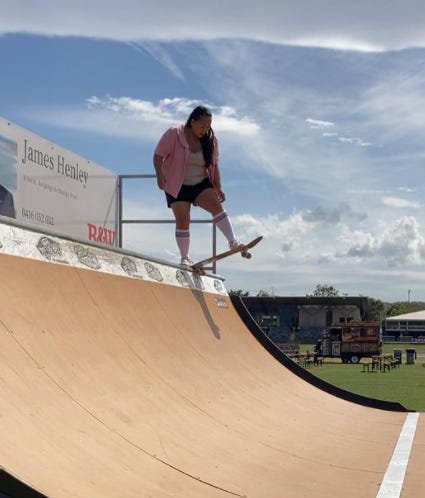
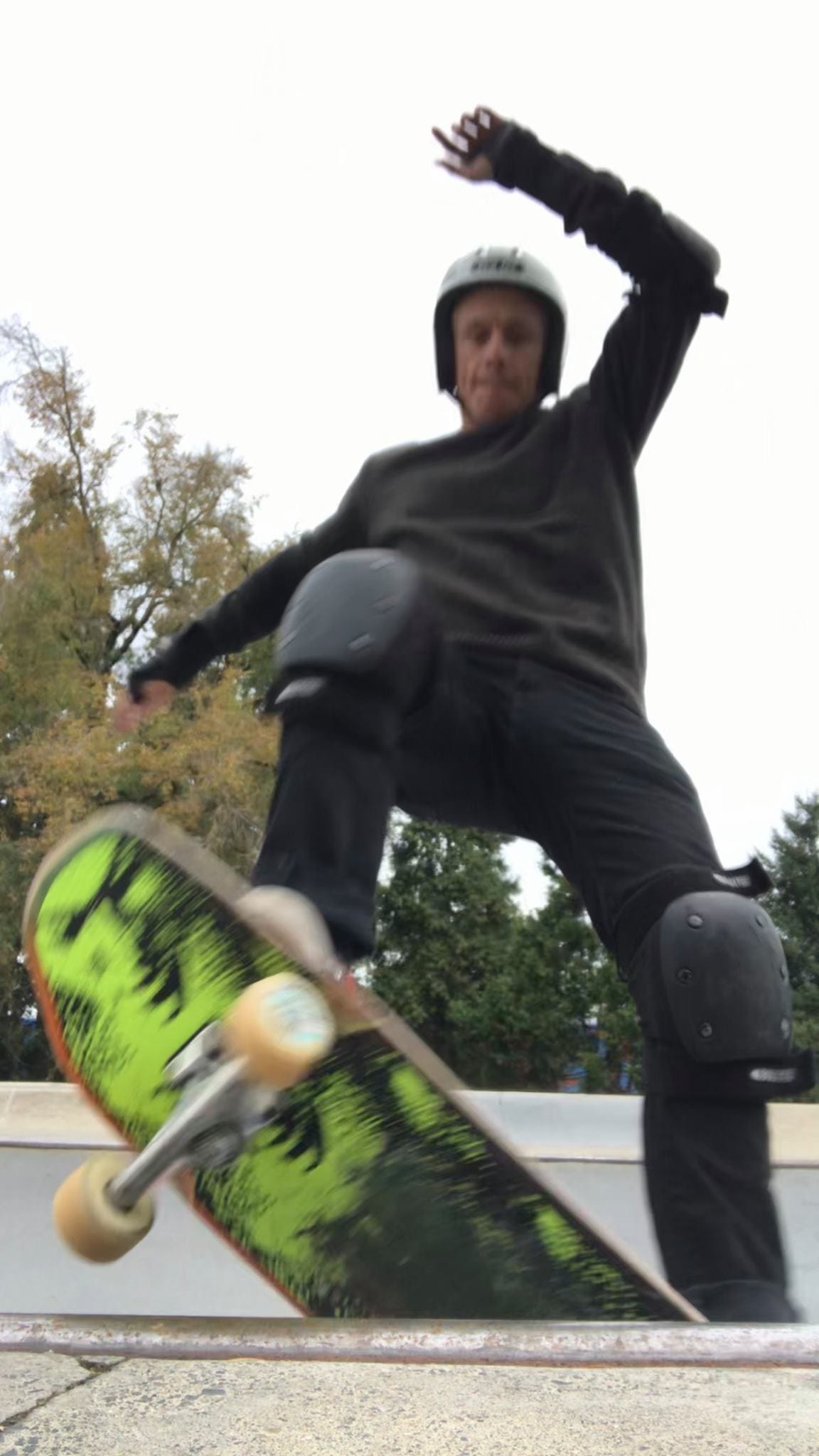
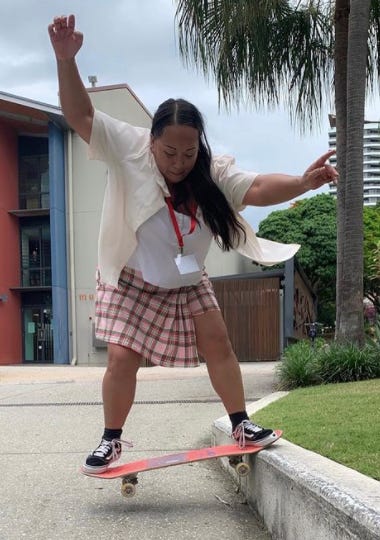
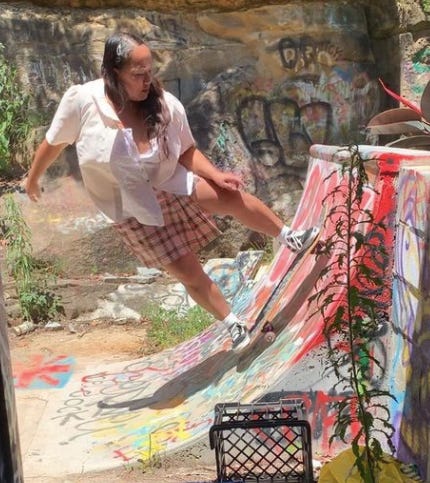

Yes. 🫶🏼